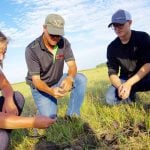Intense lobbying | The area is in its third year of drought and the agricultural sector is suffering
SACRAMENTO, Calif. (Reuters) — Drought-plagued California will ease protections for fish in the fragile San Joaquin-Sacramento River Delta, a move expected to make more water available for farming and ease political tensions in an election year.
The move marks a retreat from restrictions imposed earlier in the year, which had widely been expected to be tightened further, rather than eased, and was welcomed in the agricultural community.
“California’s agriculture is critical to the world’s food supply,” said assemblywoman Kristin Olsen, who represents part of the San Joaquin Valley, and had lobbied against the restrictions.
Read Also

Internet of Things tapped for better emissions insights
Interconnected field sensor fleet allows better soil monitoring coverage and, hopefully, live insights on farm greenhouse gas emissions and nitrogen fertilizer application for farms.
Citing recent rains, regulators said March 18 that there was enough water in the state’s reservoirs to partially ease restrictions.
“We were quite concerned at that time about the issue of public health and safety,” Tom Howard, executive director of the state Water Resources Control Board, said in a conference call March 19. “This really had the markings of a historic drought.”
The move comes after weeks of intensive lobbying from growers, lawmakers from agricultural regions and the state’s two U.S. senators, who said the restrictions, along with the possible curtailment of water rights for some agricultural and municipal customers, would harm the state’s economy.
The most populous U.S. state is in its third year of a drought that may still turn out to be one of the worst in its history despite recent storms that brought rain and snow, leaving some small communities at risk of running out of drinking water and possibly forcing farmers to leave a half-million acres unseeded.
Recent storms dropped nearly 30 centimetres of rain in some areas, boosting reservoir levels, but still leaving supplies way below normal for this time of year.
Under the new rules, which Howard said may be modified again next month, the two massive public water projects responsible for pumping water in the delta will be able to deliver to farmers and others once the state determines that there is enough flowing to meet health and sanitation needs of residents.
Scott Shapiro, an attorney specializing in water issues for the Sacramento firm Downey Brand, said expanding the allowable uses of tight water supplies was important to others, as well as farmers.
“It’s not just for agriculture, because there are other needs that may be contracted for that go beyond health and safety,” Shapiro said. “It could include other municipal, industrial and agricultural needs.”
In addition, the state planned to reduce by about a third the amount of water that the projects were required to leave in the delta as a way of protecting fish, Howard said during the press briefing.
Mark Cowin, director water re-sources for the state, said fish and wildlife experts consulted by his department said endangered species in the delta would not be harmed by the looser rules.














